#LaVar Charleston
Text
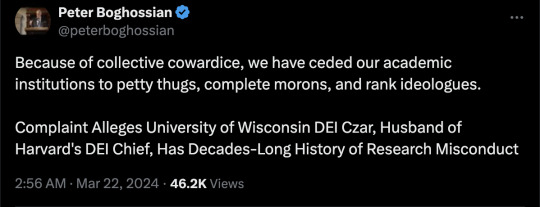
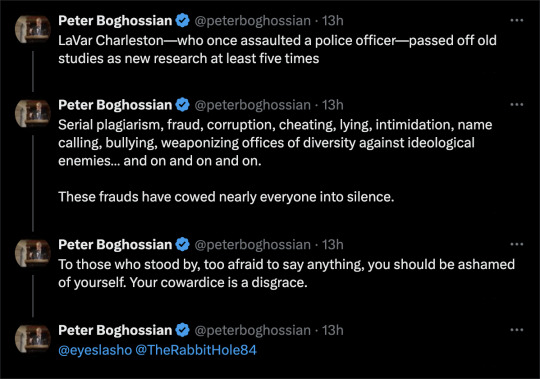
By: Aaron Sibarium
Published: Mar 21, 2024
LaVar Charleston—who once assaulted a police officer—passed off old studies as new research at least five times
The chief diversity officer of the University of Wisconsin-Madison, LaVar Charleston, who also teaches at the university’s school of education, has a decades-long track record of research misconduct, according to a complaint filed with the university on Wednesday and a Washington Free Beacon analysis. That misconduct includes presenting old studies as new research, which he has done at least five times over the course of his career.
The complaint, which was filed anonymously, implicates eight of Charleston’s publications, many of them coauthored, and accuses him of plagiarizing other scholars as well as duplicating his own work. It comes as the university is already investigating Charleston over a separate complaint filed in January, alleging that a 2014 study by him and his wife—Harvard University’s chief diversity officer, Sherri Ann Charleston—is a facsimile of a study he published in 2012.
"This is an extraordinary case of serial misrepresentation and deception," said Peter Wood, the head of the National Association of Scholars and a former associate provost at Boston University. "The closest analogy would be someone who sells the same real estate to five different buyers, all of whom are unaware of the others."
In January, Charleston won a lifetime achievement award for "excellence in higher education." The university trumpeted the award in a press release, praising his "unwavering dedication to creating inclusive environments in academia" and noting his "wealth of academic accolades."
Charleston’s CV, however, appears to have been inflated by duplicate publication, the practice of publishing the same research in multiple journals without attribution. In 2014, for example, he published a pair of papers in two separate journals—the Journal of Diversity in Higher Education and the Journal of Progressive Policy & Practice—that are near-verbatim copies of each other.
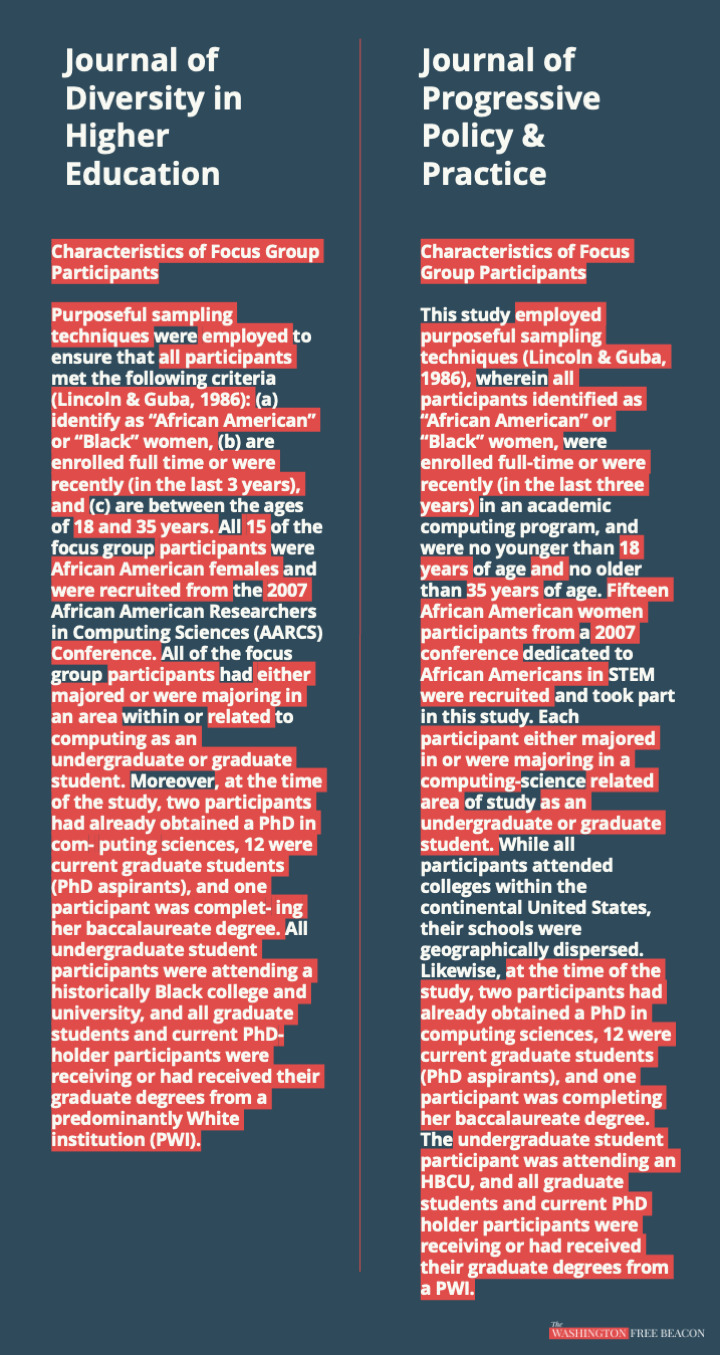
Both describe a 15-person focus group conducted by an African-American woman and feature identical quotes from participants, all of whom appear to have been recruited from the same academic conference.
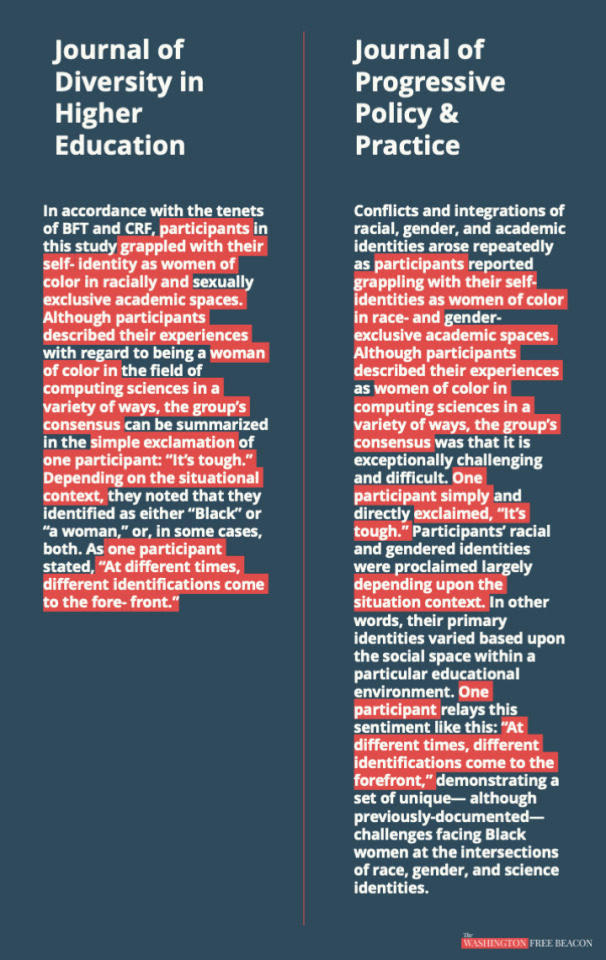
Neither paper indicates the other was published elsewhere—a troubling omission, scholars who reviewed both studies said.
"It is academic misconduct to publish essentially the same paper twice with no acknowledgment of the duplication," Alexander Riley, a sociologist at Bucknell University, told the Free Beacon. "It seems fairly clear that Charleston is gaming the system in order to get more on his CV than is merited by the amount of research he has actually done."
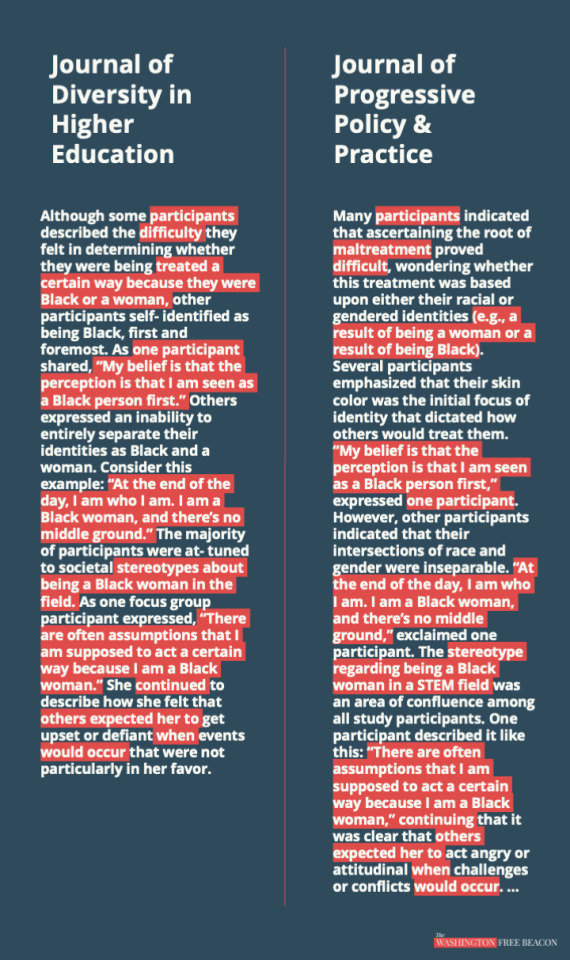
Charleston also appears to have recycled findings and interview responses from his 2010 dissertation, which involved a survey of black computer science students, in four subsequent papers: the 2012 and 2014 studies that were the subject of the previous complaint, as well as two additional studies published in 2016 and 2022.
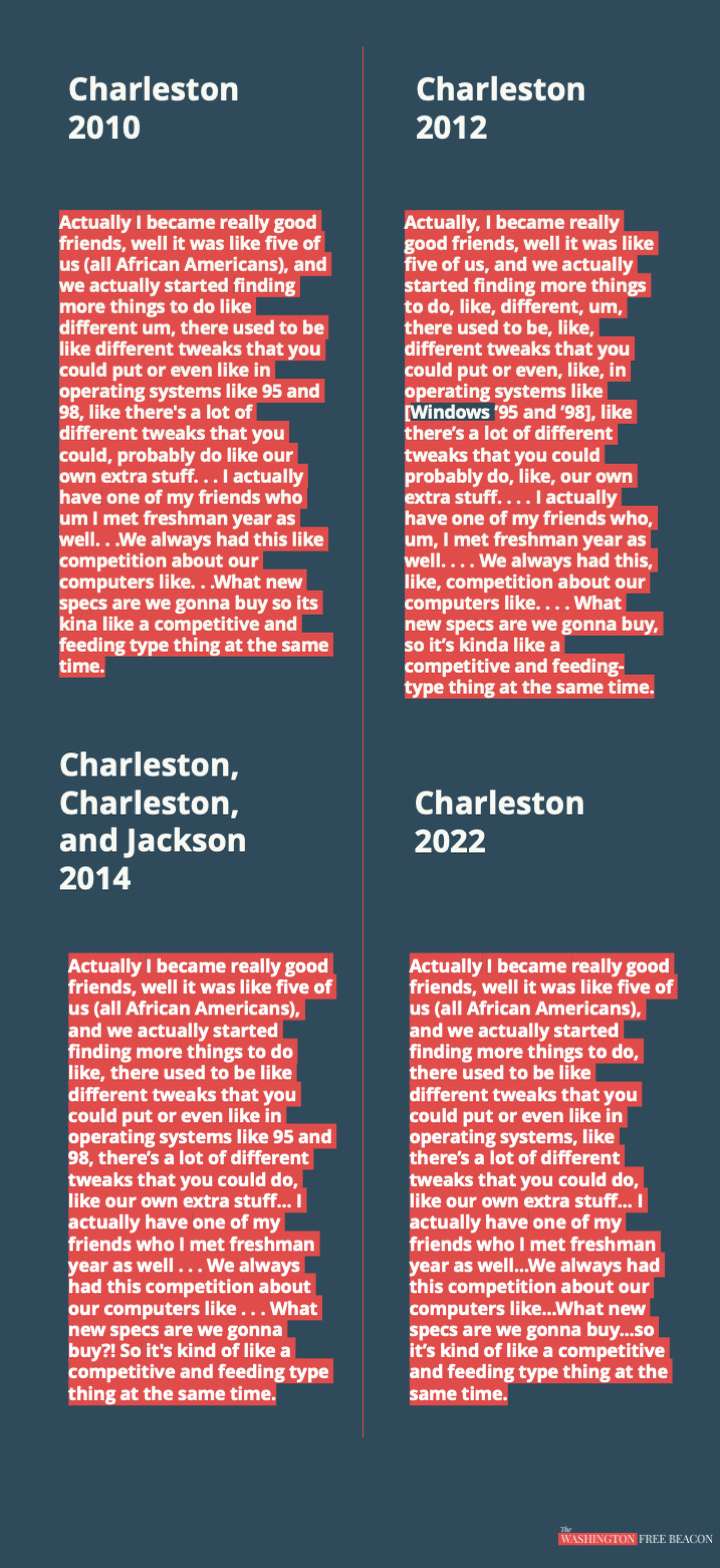
Each study is framed as a novel survey addressing a gap in the scholarly literature. None cite Charleston’s dissertation or indicate that they are drawing on previously published material.
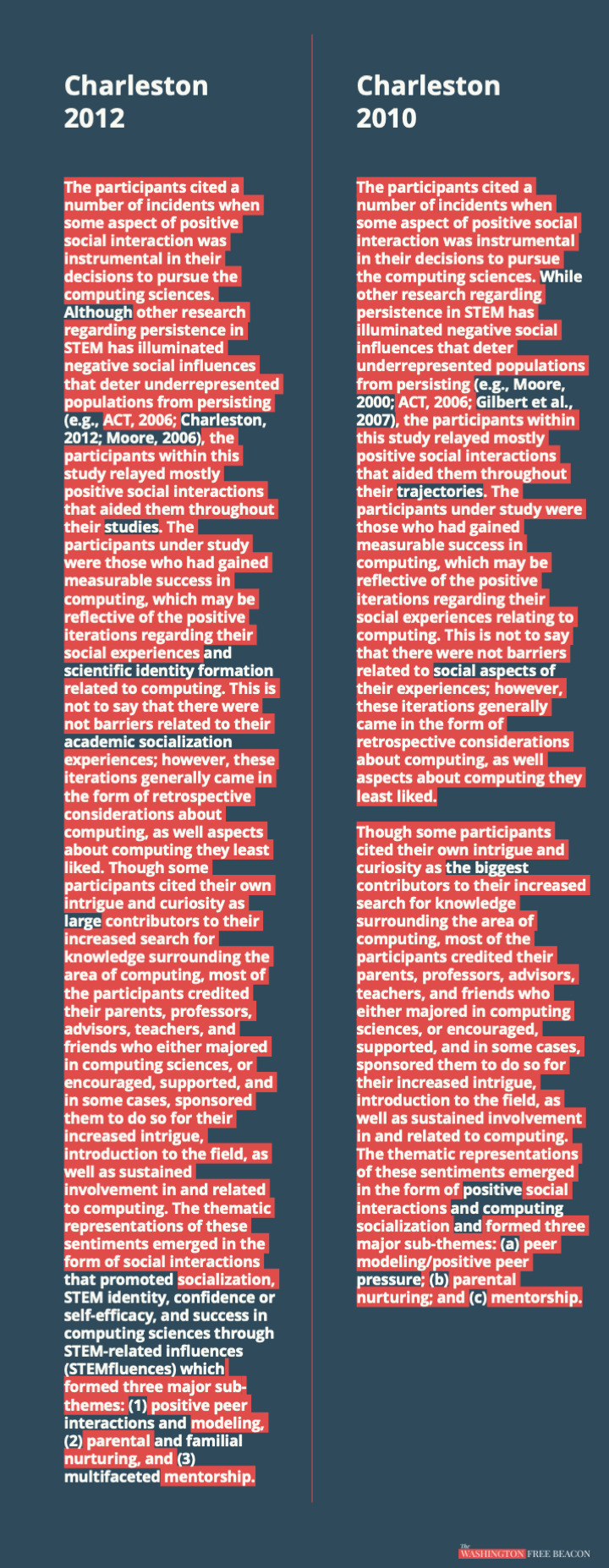
The odds that different people would give the same quotes across different studies, said Lee Jussim, a professor of psychology at Rutgers University, are about the same as the odds that "monkeys typing on typewriters would reproduce Hamlet."
Charleston did not respond to a request for comment.
The complaint raises serious questions about how a flagship public university vetted one of its top administrators, whose career has been marked not just by questionable research practices but by criminal conduct.
Shortly after joining UW-Madison as a researcher in 2009, Charleston was charged in 2011 with attempting to strangle a police officer, according to documents obtained by the MacIver Institute, a conservative think tank in Wisconsin. He avoided a conviction through the Deferred Prosecution Program, a local initiative run by the district attorney’s office that offers first-time felons the chance to do community service in lieu of jail time and removes their arrest records from public databases.
"Even with a PhD, I’m looked at as a criminal," Charleston said in an interview in 2020. "[I]t has to be because of my color."
The arrest didn’t stop Charleston from climbing the ranks of the school’s diversity bureaucracy. Between 2010 and 2017, he helped to build Wisconsin’s Equity and Inclusion Laboratory, which conducts research on "inclusive learning." He became assistant vice chancellor of student diversity at the University of Wisconsin-Whitewater in 2017, then served as the inaugural dean of diversity, equity and inclusion at UW-Madison’s School of Education—the third-ranked education school in the country, according to US News and World Report. He became the chief diversity officer of the entire university in 2021.
Charleston is also a clinical professor of education, has led "anti-racism" workshops for Wisconsin public school teachers, and sits on the state’s Equity and Inclusion Council, which helps "advance diversity, equity, and inclusion practices across Wisconsin state government."
The complaint calls into question the originality of the feted diversity scholar, who draws a $280,000 salary from UW-Madison and oversees tutoring services for students.
"The two 2014 papers do indeed appear to be two versions of the same paper," Riley said. "I don't see the two as distinct from one another in any substantive way."
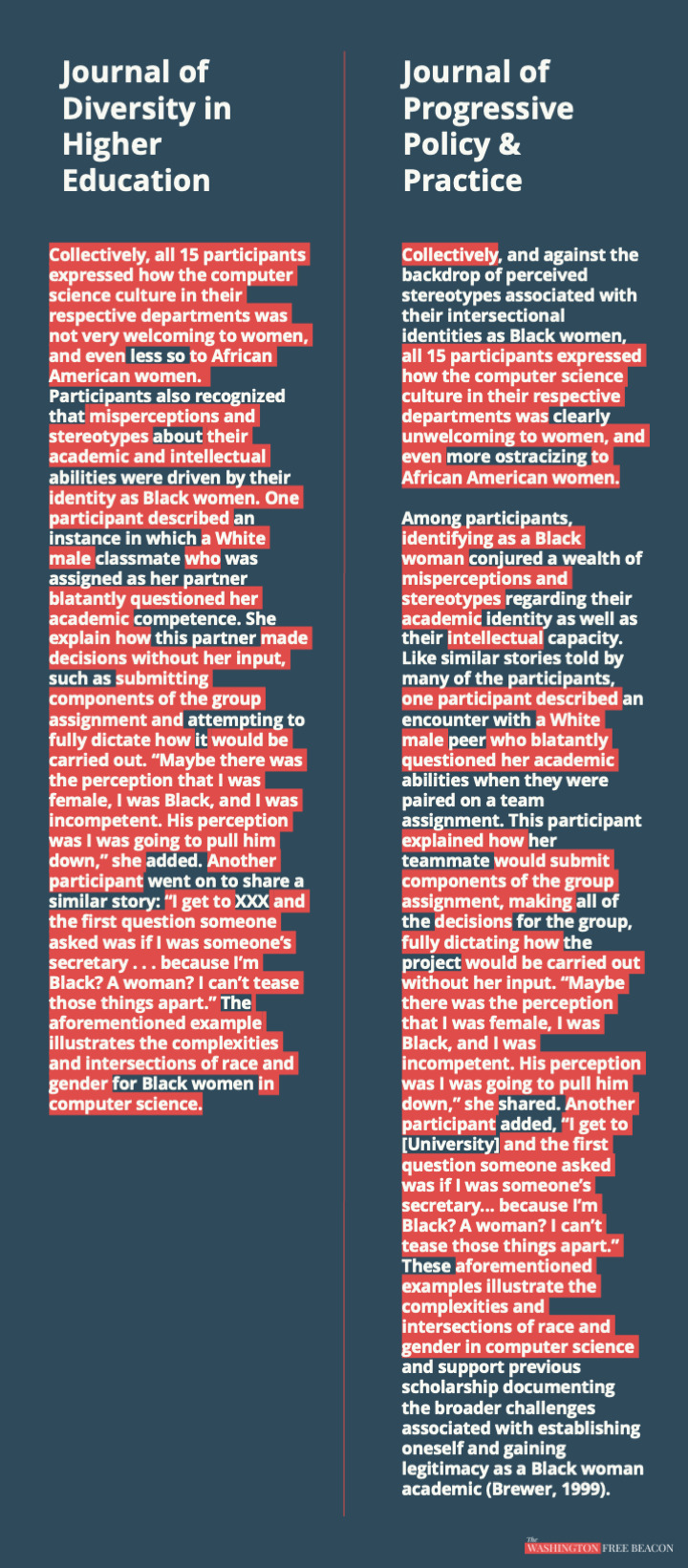
Both papers also share a prominent coauthor: Jerlando Jackson, now the dean of the Michigan State University College of Education, who advised Charleston’s dissertation at UW-Madison and also coauthored one of the studies based on it. The overlap raises additional questions about norms of academic integrity at education schools and within the field of DEI scholarship, which has come under intense scrutiny in recent months amid a drip-drip of plagiarism scandals.
"Either [Charleston and Jackson] are ignorant of this principle of research publication ethics," Riley said, referring to rules against duplicate publication, "or they were both aware of what they were doing."
Jackson did not respond to a request for comment.
The University of Wisconsin-Madison said it"takes all allegations of research misconduct seriously" and that it would investigate the complaint. Charleston, the school added, is a "valued member of the University of Wisconsin-Madison leadership team and we continue to support his work."
Wednesday’s complaint marks the fourth time this year that a DEI official has been hit with charges of research misconduct. In addition to Sherri Ann Charleston, Harvard’s chief diversity officer, plagiarism allegations have been made against Shirley Green, the Title IX coordinator for Harvard Extension School, and Alade McKen, the chief diversity officer of Columbia Medical School. The deluge followed the downfall of former Harvard president Claudine Gay, who resigned in January after half of her published work was found to contain plagiarized material.
Unlike those other officials, who work for private universities with lavish endowments, Charleston is a government employee subject to a state budget. His role was on the chopping block last year after Wisconsin Republicans proposed a budget that would have cut $32 million from the UW system—the exact amount it spends on DEI initiatives.
A watered-down version of the proposal still drew fierce blowback from the University of Wisconsin Board of Regents, which in December rejected a deal to cap DEI staff in exchange for pay raises and a new engineering school. The board reversed course after news broke that it had prioritized positions like Charleston’s over $800 million in additional funding.
That money has subsidized a scholar who appears to have little new to say. The four studies based on Charleston’s dissertation, which was submitted to the University of Wisconsin-Madison, are strikingly similar to each other, regurgitating not just interview results but entire pages of text.
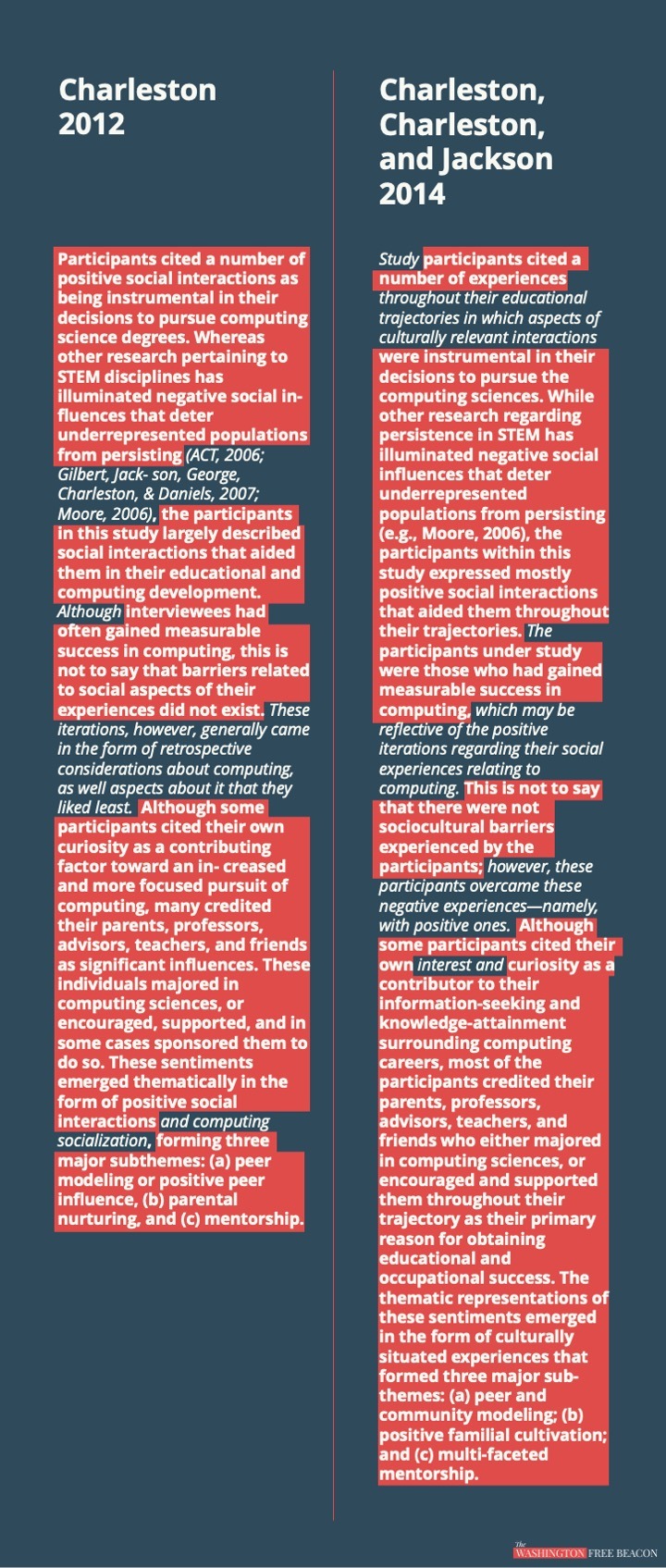
Each one discusses the challenges faced by African-American science students and argues, among other things, that mentorship can promote success in computer science. Three of the four studies include identical descriptions of survey participants, whose testimonials form the backbone for each paper.
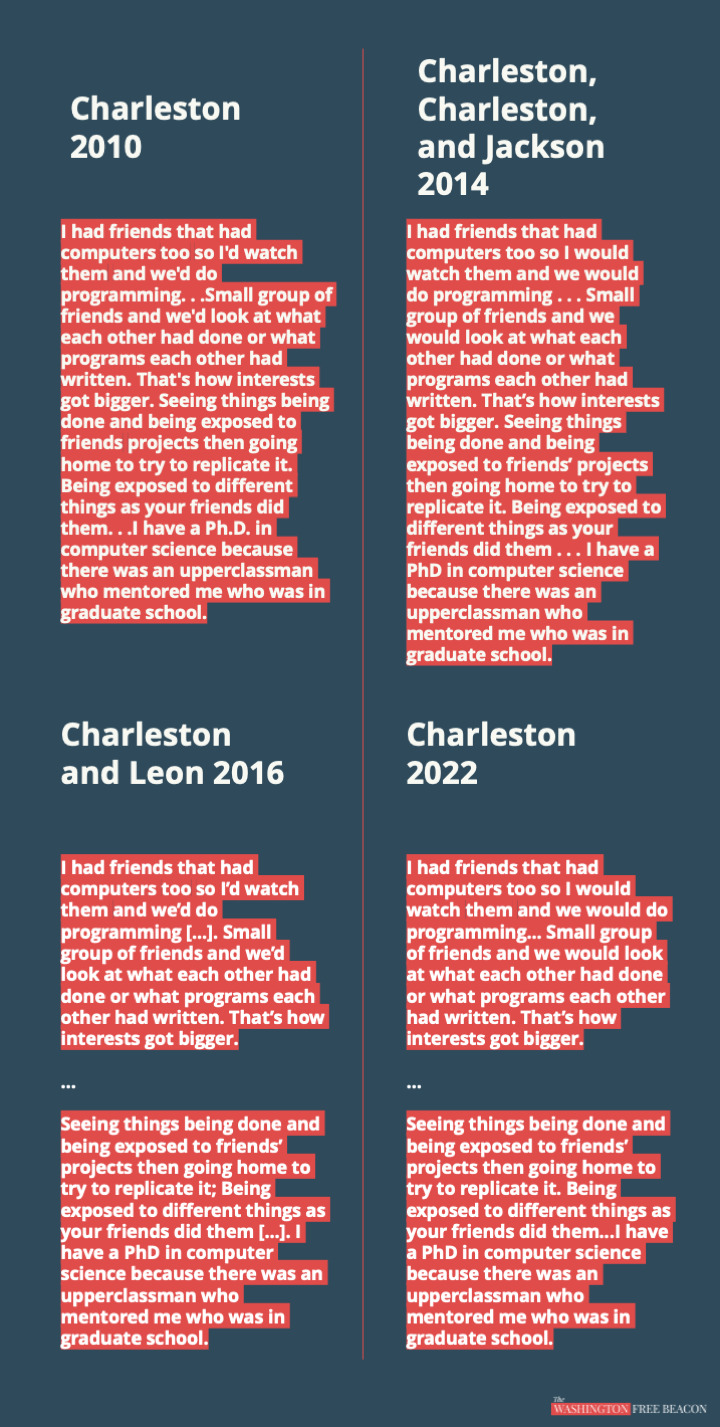
"I know of no other cases where a researcher has simply repeated his dissertation findings like a broken record for twelve years," Wood said.
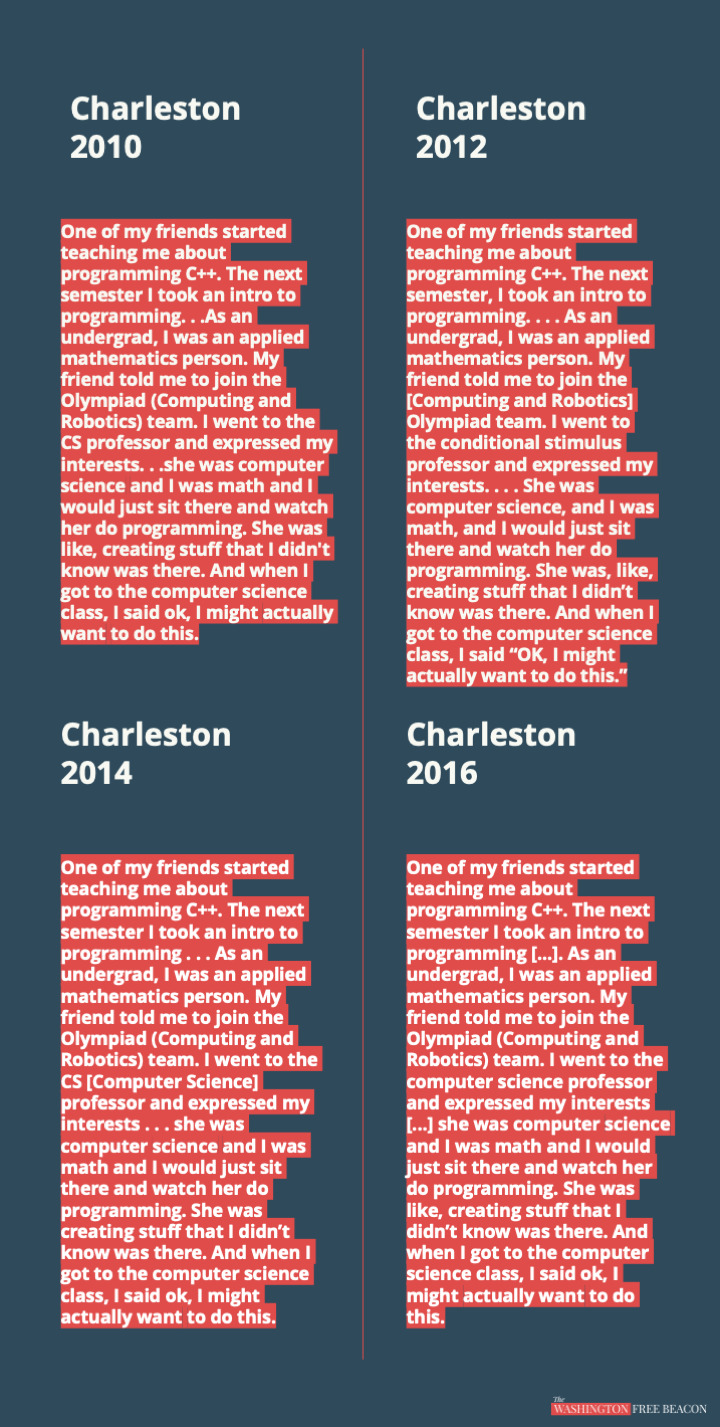
While scholars can reuse data as much as they like and often turn their dissertations into peer-reviewed articles, they are expected to provide appropriate attribution to earlier research if it has already appeared in an academic journal. Failure to do so can result in retractions and infringe on the copyright of the publisher.
Duplicate publication is sometimes considered a more serious offense than plagiarism because, on top of stealing a journal’s intellectual property and padding a scholar’s CV, it biases meta-analyses—papers that aggregate the results of prior studies and use them to make statistical generalizations about a body of research. Some meta-analyses in education focus on the very issues Charleston’s work has addressed, including the effects of mentorship and diversity training.
Riley, the Bucknell sociologist, argued that the four studies didn’t quite meet the bar for "unethical behavior" because they were all based on a single dissertation, unlike the pair of papers from 2014. But, he added, the redundancies were revealing nonetheless.
"I gather that there are a lot of people doing this in the DEI universe—basically reiterating the same claims over and over and over again in different venues," Riley said. "The field draws such people to it more or less naturally, given the orthodoxy on which it is based."
The complaint also accuses Charleston of plagiarizing other scholars in his dissertation and some of his peer-reviewed papers, including the one from 2012. He lifts several passages from a Ph.D. thesis by Leslie Pendleton Graham, who earned her Ph.D. in counselor education in 1997, without citing her in a footnote or parentheses.
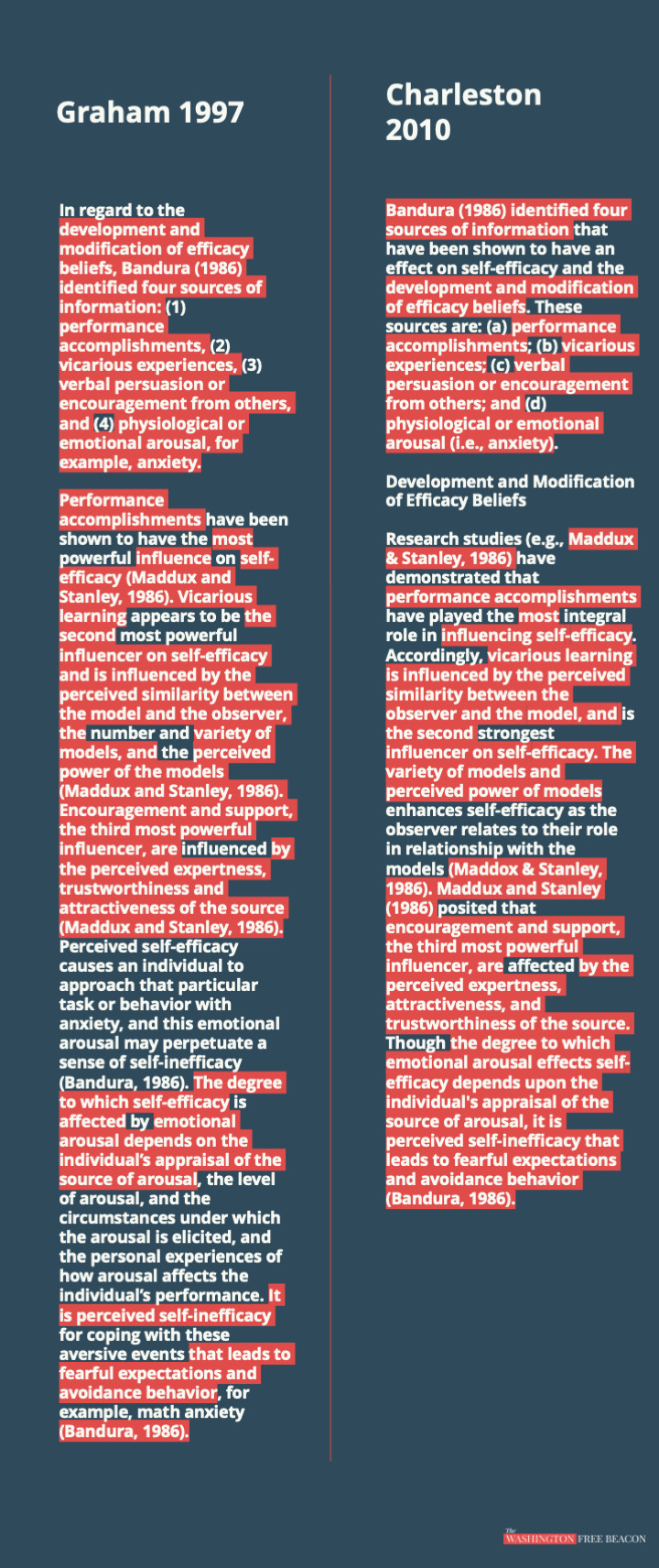
He also borrows from a dissertation by Craig Alan Green, who earned his Ph.D. from the University of Tennessee-Knoxville in 2008, without any sort of attribution.
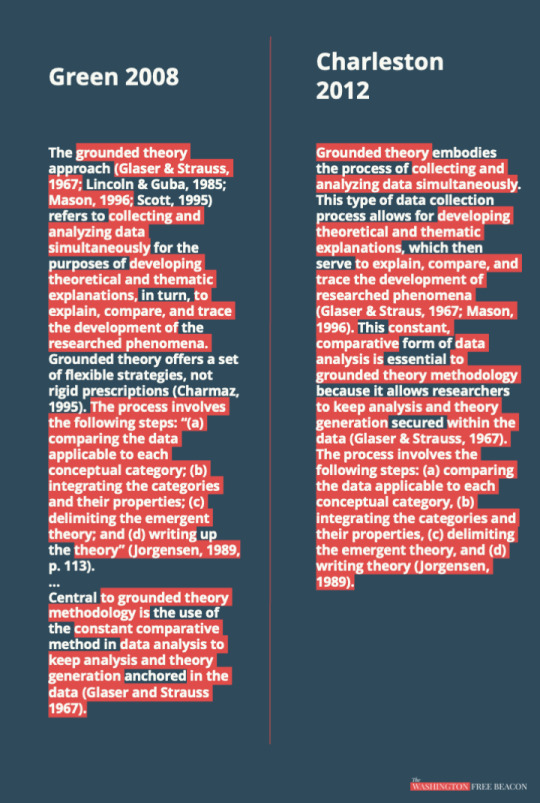
The complaint points out that by recycling a plagiarism-laden thesis, Charleston ensured his subsequent work would contain plagiarism.
"Much of LaVar’s scholarly work since the dissertation lifts language from the dissertation verbatim," the complaint reads. "But the dissertation is full of plagiarism. So LaVar’s peer-reviewed work has plagiarism throughout."
#Aaron Sibarium#LaVar Charleston#plagiarism#academic fraud#academic corruption#DEI#diversity equity and inclusion#diversity#equity#inclusion#DEI bureaucracy#DEI must die#diversity hire#religion is a mental illness
4 notes
·
View notes
Text
Harvard’s chief diversity and inclusion officer has become the latest member of staff to be accused of plagiarism, including a failure to properly cite her own husband’s study.
An anonymous complaint has listed at least 40 examples of alleged plagiarism by Sherri Ann Charleston dating from 2009, a decade before she joined Harvard, the Washington Free Beacon reported.
The allegations, which include failing to properly cite other academics’ work and lifting portions of text without quotation marks, come just weeks after Claudine Gay, Harvard University’s former president, resigned in the wake of a plagiarism scandal.
According to the Beacon, Dr Charleston, who is a historian, submitted a 2009 dissertation to the University of Michigan which included quotes or paraphrases from nearly a dozen scholars without proper attribution.
The complaint also alleges Dr Charleston ultimately took credit for a study that her husband, LaVar Charleston, wrote in 2012. He is now the University of Wisconsin-Madison’s deputy vice chancellor for diversity and inclusion.
That alleged act of plagiarism involved Dr Charleston recycling large portions of her husband’s earlier paper in a peer-reviewed article that she co-wrote in 2014, according to the complaint.
The article, published in the Journal of Negro Education, reportedly had the same findings, method and survey subject descriptions from her husband’s original work.
“The 2014 paper appears to be entirely counterfeit,” Peter Wood, the head of the National Association of Scholars and a former associate provost at Boston University, told the Beacon. “This is research fraud pure and simple.”
Steve McGuire, a former political theory professor at Villanova University, reviewed both the 2012 and 2014 papers.
“Sherri Charleston appears to have used somebody else’s research without proper attribution,” he told the Beacon.
The full complaint has been reportedly filed with Harvard, the University of Michigan and the University of Wisconsin-Madison. Neither Dr Charleston nor her husband have commented on the allegations.
Dr Charleston was the chief affirmative action officer at the University of Wisconsin-Madison before switching to Harvard in August 2020, becoming its first chief diversity officer.
According to the Harvard Crimson, she was involved in the university’s presidential search process that resulted in the selection of Dr Gay in December 2022.
Dr Gay resigned on Jan 2 after facing allegations of plagiarism as well as criticism for her comments about anti-Semitism on campus.
Harvard’s board investigated the plagiarism complaints against the president in December and found “a few instances of inadequate citation” but “no violation of Harvard’s standard for research misconduct”.
#nunyas news#academics are now living in fear#well the ones that cheated are at least I hope#which is goood
8 notes
·
View notes
Text
Sí eres de las personas que Lamento la caída de las redes sociales pero a la vez te fue indiferente, perteneces a esa generación de personas conocida como generación X.
Probablemente naciste entre 1965 1981. Es una generación híbrida. Ninguna generación es tan salvaje y civilizada a la vés cómo está. Les es indiferente escuchar música en Spotify como en un tornamesa manual de 45 rpm, ver las noticias en Google cómo sintonizar un radio de a.m. les es indiferente escribir una carta a máquina como en un portátil, lavar la ropa en un balde como en una moderna lavadora. Son una generación todo terreno, qué puede usar Netflix en un Smart TV Cómo verse cualquier serie en un TV convencional, disfrutar de una rumba electrónica en el parque o una fogata en el campo. La generación que lo ha visto todo, desde la carrera espacial, la guerra fría, la era digital, La Era atómica y virtual. Desde el tango, el Charleston y el chachachá hasta Maluma, yeison Jiménez y Karol G
0 notes
Text
Authorities search for suspect following fatal N. Charleston shooting
NORTH CHARLESTON, S.C. (WCBD) — Authorities are continuing to search for a 29-year-old man in connection with a fatal shooting in North Charleston, Tuesday afternoon.
Lavar Walker is accused of shooting 33-year-old Canei Harrison.
Police found Harrison bleeding from a gunshot wound to the head outside a home.
Medics transported her to the Medical University of South Carolina where we learned on…
View On WordPress
0 notes
Text




By: Aaron Sibarium
Published: Jan 30, 2024
It's not just Claudine Gay. Harvard University's chief diversity and inclusion officer, Sherri Ann Charleston, appears to have plagiarized extensively in her academic work, lifting large portions of text without quotation marks and even taking credit for a study done by another scholar—her own husband—according to a complaint filed with the university on Monday and a Washington Free Beacon analysis.
The complaint makes 40 allegations of plagiarism that span the entirety of Charleston's thin publication record. In her 2009 dissertation, submitted to the University of Michigan, Charleston quotes or paraphrases nearly a dozen scholars without proper attribution, the complaint alleges. And in her sole peer-reviewed journal article—coauthored with her husband, LaVar Charleston, in 2014—the couple recycle much of a 2012 study published by LaVar Charleston, the deputy vice chancellor for diversity and inclusion at the University of Wisconsin-Madison, framing the old material as new research.
Through that sleight of hand, Sherri Ann Charleston effectively took credit for her husband's work. The 2014 paper, which was also coauthored with Jerlando Jackson, now the dean of Michigan State University's College of Education, and appeared in the Journal of Negro Education, has the same methods, findings, and description of survey subjects as the 2012 study, which involved interviews with black computer science students and was first published by the Journal of Diversity in Higher Education.

The two papers even report identical interview responses from those students. The overlap suggests that the authors did not conduct new interviews for the 2014 study but instead relied on LaVar Charleston's interviews from 2012—a severe breach of research ethics, according to experts who reviewed the allegations.
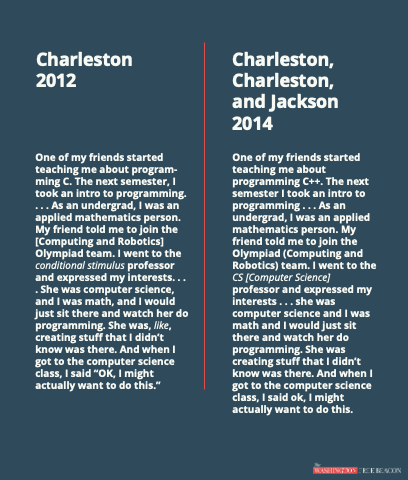
"The 2014 paper appears to be entirely counterfeit," said Peter Wood, the head of the National Association of Scholars and a former associate provost at Boston University, where he ran several academic integrity probes. "This is research fraud pure and simple."
Sherri Ann Charleston was the chief affirmative action officer at the University of Wisconsin-Madison before she joined Harvard in August 2020 as its first-ever chief diversity officer. In that capacity, Charleston served on the staff advisory committee that helped guide the university's presidential search process that resulted in the selection of former Harvard president Claudine Gay in December 2022, according to the Harvard Crimson.
A historian and attorney by training, Charleston has taught courses on gender studies at the University of Wisconsin, according to her Harvard bio, which describes her as "one of the nation's leading experts in diversity." The site says that her work involves "translating diversity and inclusion research into practice for students, staff, researchers, postdoctoral fellows and faculty of color."
Experts who reviewed the allegations against Charleston said that they ranged from minor plagiarism to possible data fraud and warrant an investigation. Some also argued that Charleston had committed a more serious scholarly sin than Gay, Harvard's former president, who resigned in January after she was accused of lifting long passages from other authors without proper attribution.
Papers that omit a few citations or quotation marks rarely receive more than a correction, experts said. But when scholars recycle large chunks of a previous study—especially its data or conclusions—without attribution, the duplicate paper is often retracted and can even violate copyright law.
That offense, known as duplicate publication, is typically a form of self-plagiarism in which authors republish old work in a bid to pad their résumés. Here, though, the duplicate paper added two new authors, Sherri Ann Charleston and Jerlando Jackson, who had no involvement in the original, letting them claim credit for the research and making them party to the con.
"Sherri Charleston appears to have used somebody else's research without proper attribution," said Steve McGuire, a former political theory professor at Villanova University, who reviewed both the 2012 and 2014 papers.
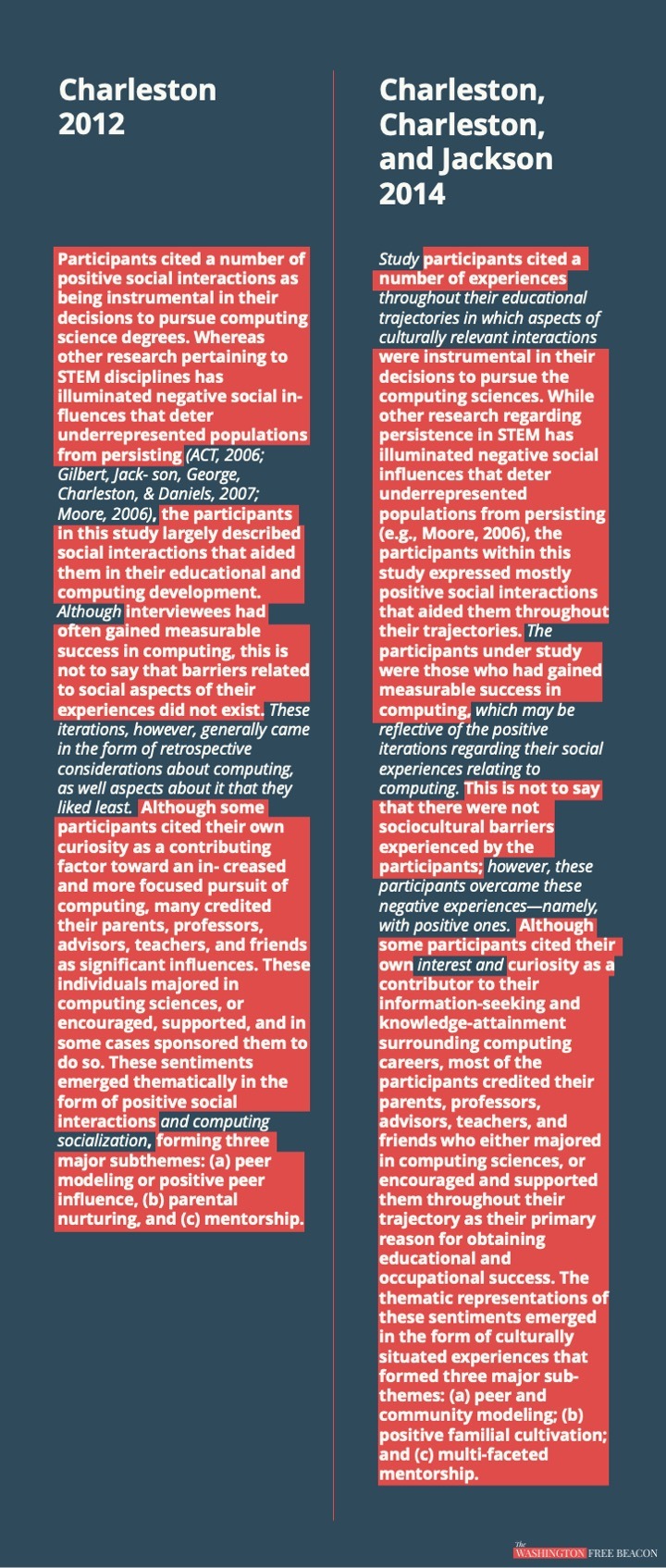
One-fifth of the 2014 paper, including two-thirds of its "findings" section, was published in the 2012 study, according to the complaint, and three interview responses are identical in both articles, suggesting they come from the same survey.
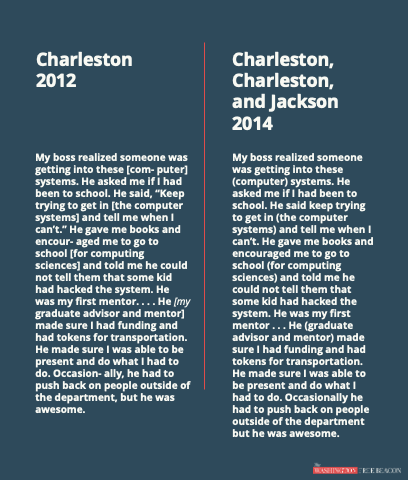
According to Lee Jussim, a social psychologist at Rutgers University, "it is essentially impossible for two different people in two different studies to produce the same quote." At best, he said, the authors got their wires crossed and mixed up interviews from two separate surveys, both of which just happened to involve 37 participants with the exact same demographic profile. At worst, the authors committed data fraud by framing old survey responses as new ones—a separate and more serious offense.
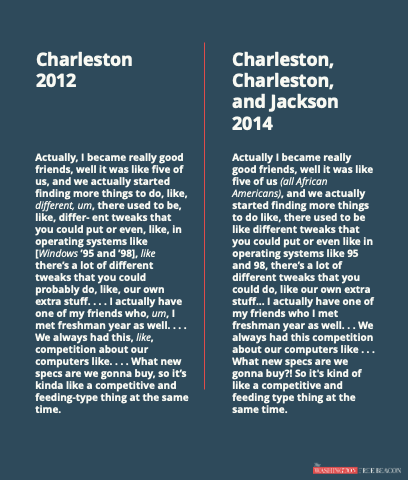
The Journal of Negro Education did not respond to a request for comment. Sherri Ann Charleston, LaVar Charleston, and Jerlando Jackson did not respond to requests for comment.

Monday's complaint, which was filed anonymously, comes as Harvard is facing questions about the integrity of its research affiliates and the ideology of its diversity bureaucrats, most of whom report to the sprawling office that Sherri Ann Charleston oversees.
The Dana-Farber Cancer Institute, one of Harvard Medical School's three teaching hospitals, announced in January that it would retract six papers and correct dozens more after some of its top executives were accused of data manipulation. That news came on the heels of a viral essay in which Carole Hooven, a Harvard biologist, described how she had been hounded out of a teaching role by her department's diversity committee after she said in an interview that there are only two sexes.
The school is also facing an ongoing congressional probe over its handling of anti-Semitism and its response to the plagiarism allegations against Gay, which Harvard initially sought to suppress with legal saber-rattling. Half of Gay's published work contained plagiarized material, ranging from single sentences to entire paragraphs, with some of the most severe lifts coming in her dissertation. Though Gay stepped down as president on January 2, she remains a tenured faculty member drawing a $900,000 annual salary.
Some of Charleston's offenses are similar to Gay's. In her 2009 dissertation, for example, Charleston borrows a sentence from Eric Arnesen's 1991 book Waterfront Workers of New Orleans: Race, Class, and Politics, 1863-1923, without quotation marks and without citing Arnesen's work in a footnote.
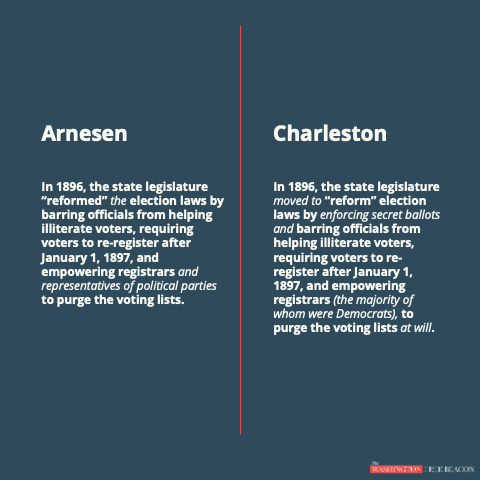
She also lifts full paragraphs from her thesis adviser, Rebecca Scott, while making minimal semantic tweaks.
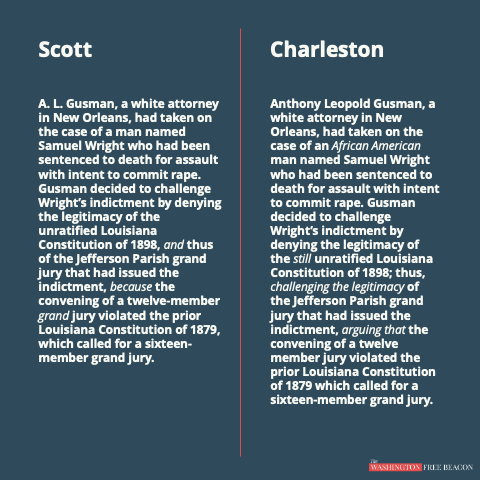
"There's simply not enough difference to consider them original words," said Jonathan Bailey, the founder of the website Plagiarism Today. "Though the sources in those examples are cited"—Charleston includes a footnote to Scott at the end of each passage—"the text either needed to be quoted or properly paraphrased."

Bailey added that the plagiarism of Scott alone merited an investigation—ideally, he said, "by a neutral party with no ties to either the school or the school's critics."
Harvard did not respond to a request for comment. Scott and Arnesen did not respond to requests for comment.
Charleston also lifted language from Louis Pérez, an historian at the University of North Carolina-Chapel Hill; Alejandro de la Fuente, an historian at Harvard; and Ada Ferrer, an historian at New York University, among other scholars.
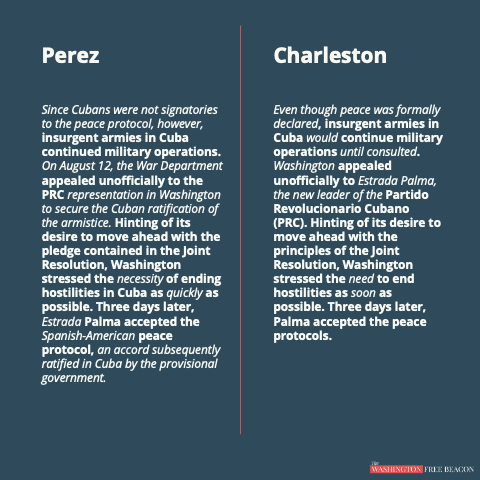
Charleston cites each source in a footnote but omits quotation marks around language copied verbatim. The omissions violate Harvard's Guide to Using Sources, a document produced for incoming students, which states that quotation marks are required when "you copy language word for word."
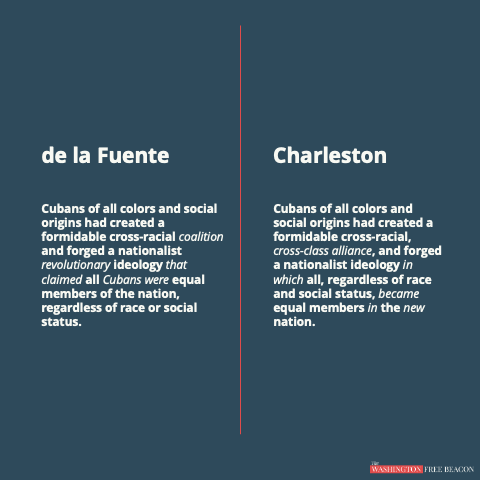
Pérez, de la Fuente, and Ferrer did not respond to requests for comment.

The range of examples presented in the complaint, which was also filed to the University of Michigan and the University of Wisconsin-Madison, highlights how plagiarism can shade into more severe forms of misconduct when it involves interviews or other data.
In fact, some experts said the term "plagiarism" didn't quite capture the dishonesty of duplicate publication, which is sometimes categorized as a separate offense and accounts for 14 percent of all paper retractions in the life sciences.
"You cannot just republish an old paper as if it is a new paper," Jussim, the Rutgers psychologist, said. "If you do, that is not exactly plagiarism; it's more like fraud."
Wood said the case was really a combination of the two offenses. "Because the second paper, on which Sherri Ann Charleston is one of the three co-authors, recycles so much of the text of the original paper by LaVar J. Charleston, this does have the earmarks of plagiarism, but the plagiarism is compounded by an even larger effort to deceive," he said. "The universities and journals need to investigate."
While scholars can reuse data across multiple papers, they must make clear when they are doing so and provide appropriate attribution to earlier studies, per guidelines from the Office of Research Integrity and the editorial policies of top academic journals, including Nature and Cell.
But the 2014 paper never indicates that it is reusing research from 2012. Instead, it claims to present new data that fill a "gap" in the literature and "corroborate" the 2012 study, among others, and on two occasions refers to survey subjects as "participants in this study."
Those participants appear to be the same people whom LaVar Charleston interviewed in 2012. Both surveys involved the same number of undergraduates, graduate students, Ph.D.s, and students at historically black colleges—all drawn from the same computer science conference—a similarity that experts said was a red flag.
"It is curious that the proportions are identical," said Debora Weber-Wulff, a German computer scientist who researches plagiarism and other forms of academic misconduct. "This would be grounds for the universities in question to request the data and investigate."
Jussim agreed. "This seems sufficiently improbable that, absent something saying they are re-reporting an already-published study, it would be fraud," he said.
LaVar Charleston did not respond to a request for comment about whether the two studies used the same interviews. The University of Michigan said it was "committed to fostering and upholding the highest ethical standards in research and scholarship," but declined to comment on the complaint. The University of Wisconsin-Madison told the Free Beacon it had "initiated an assessment in response to the allegations."
The main difference between the papers is a long section in the 2014 article about "culturally responsive pedagogy theory," which the authors say their findings support. Both articles are littered with the tropes of progressive scholarship, including a disclaimer about "positionality"—the authors assure readers that they reflected on their own "racial, gender, and socioeconomic status"—and a lament that computer science is a "White male-dominated field."
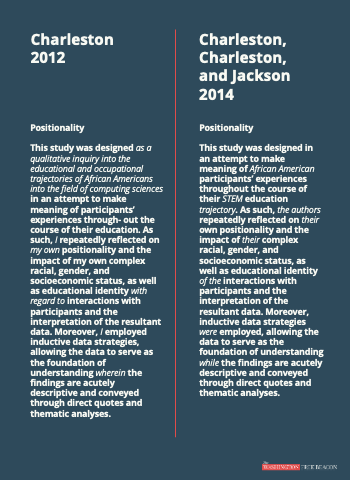
Both also criticize the idea that "computing sciences is for nerds, only for White people, [and] only for geniuses."
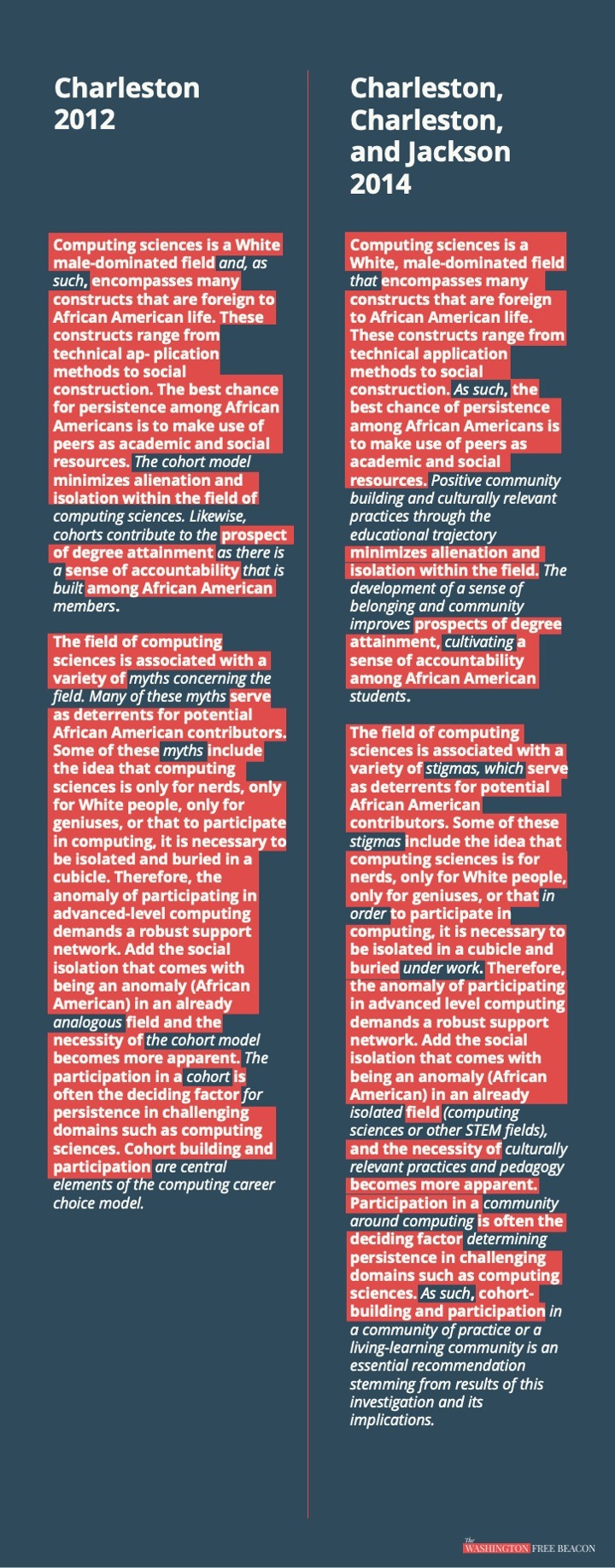
Such language is typical of the diversity initiatives Charleston oversees. Since 2020, her office has pumped out a stream of materials that bemoan the "weaponization of whiteness," discuss the ins and outs of "white fragility," and urge students to "call out" their peers for "harmful words." One message, signed by Charleston herself, was titled "A Call to Dismantle Intersecting Oppressions."
"We must continue to work against systematic oppression in all its forms—racism, sexism, homophobia, ableism, and more," she wrote.
Her office also curates resources for students seeking to become fluent in progressive patois, including a "glossary of diversity, inclusion and belonging (DIB) terms" that provides examples of "gaslighting."
Tactics can include "shooting down the target's ideas," the entry reads—or "taking credit for them."
==
Here we go again...
If you haven't already figured it out, the DEI-related faux-"disciplines" - the "Studies": Ethnic Studies, Women's Studies, Gender Studies, Postcolonial Studies, Media Studies, etc - are the most corrupt, the most ideological with the absolute lowest academic standards of all. All they care about is echoing back the "correct" opinions, not valid scholarship.
And yet, somehow these lunatics and fanatics end up the most powerful people in the asylum.
Harvard needs to fumigate the house, top to bottom.
#Aaron Sibarium#Sherri Ann Charleston#Claudine Gay#Harvard#Harvard University#academic corruption#DEI#DEI bureaucracy#diversity officer#chief diversity officer#diversity equity and inclusion#diversity#equity#inclusion#plagiarism#academic fraud
8 notes
·
View notes